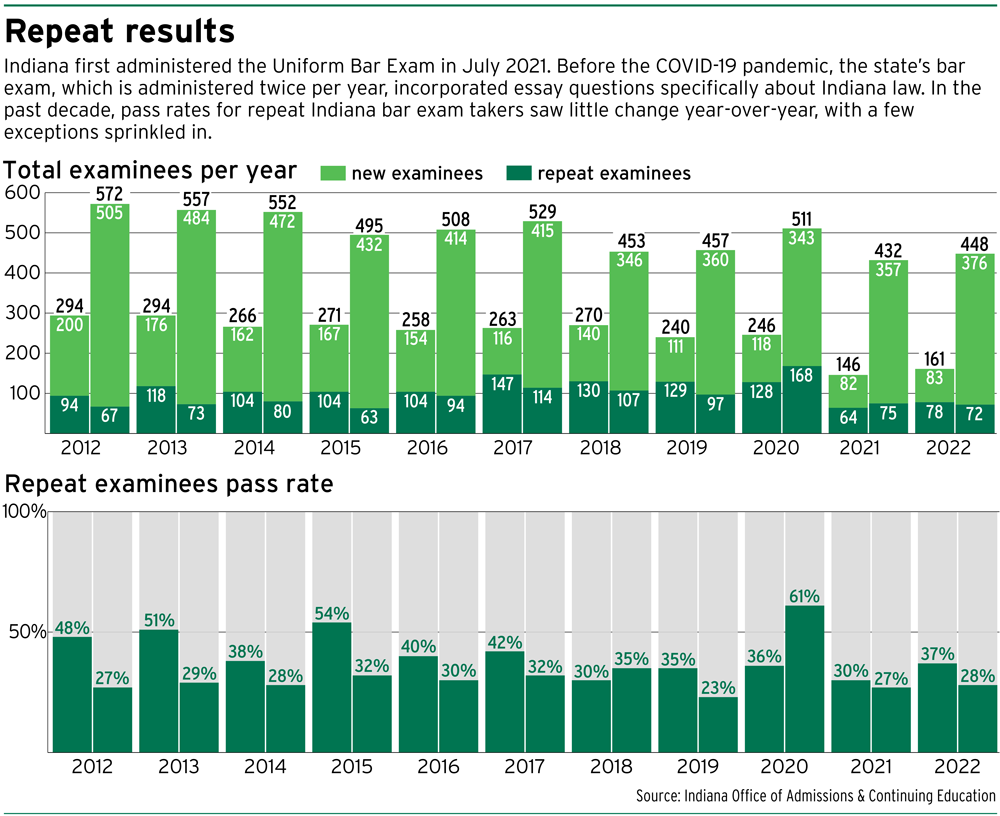Subscriber Benefit
As a subscriber you can listen to articles at work, in the car, or while you work out. Subscribe NowIt was devastating news.
The first time Justin Davis failed the bar exam, he wasn’t surprised. The second time, however, was life-altering.
After graduating from Notre Dame Law School in 2011, Davis — who asked that Indiana Lawyer not use his real name — took the Tennessee bar exam without really studying. He was clerking at the time and failed narrowly.
Although he was disappointed, Davis signed up for a bar review class and took the next exam. When he failed that one, it hit him like a wrecking ball, leaving him unsure of what to do next.
“The second go-round had a pretty big impact on my trajectory, as I had a strong job offer contingent on passing that 2012 bar that I lost,” Davis said. “It led me to looking at other career choices.”
But then Davis was contacted by the Tennessee Bar, which admitted it had incorrectly calculated his exam scores. As it turned out, he had, indeed, passed the exam the second time around.
“They had inadvertently given the scores from a portion of my test to someone else,” he said. “So they had only graded me on 75% of the test.”
Davis currently practices law in Indiana, where he was waived into state bar admission based on his years of experience.
Studying for and passing the bar exam is a major milestone for every law school graduate. Months of preparation — and money — are invested to sit for a condensed two-day exam. But what happens when the results come back negative?
While a bar exam failure may leave some test-takers feeling defeated or embarrassed, Hoosier attorneys who’ve taken that road advise that the impact of a bar exam failure on the trajectory of your legal career will be slight — if nothing at all.
Slimmer chances

Based on the statistics, repeat bar examinees in Indiana often face an uphill battle in their subsequent attempts to pass the bar, said Bradley Skolnik, executive director of the Indiana Office of Admissions & Continuing Education.
Looking at Indiana’s data over the past decade, Skolnik said repeat test-takers post significantly lower pass rates after they’ve failed the bar exam once. However, he noted there are some instances of Indiana examinees passing on the seventh or eighth try.
“So it can be done,” Skolnik said.
Indiana does not keep track of how many times a repeat examinee takes the bar exam, he said. The Hoosier State also does not have a limit on how many times an examinee can sit for the bar exam. Failing the bar can result from a variety of factors, but ultimately, Skolnik said an unsuccessful first attempt should not halt a law school graduate from pursuing their legal dreams.
“It’s certainly very disappointing, but they should not give up and should try to ascertain what areas they need to improve in so they have a better a chance of passing the next time,” he said.
Diagnosing the problem

Holly Wanzer, a family law attorney at Wanzer Edwards P.C., has served as an instructor for the IndyBar Review program for more than a decade. She noted that for law graduates, reaching the exam is momentous.
“You’ve just been through law school, which is a big experience, and you’ve successfully completed that, but you have another hurdle to cross to be a licensed attorney,” Wanzer said. “And that’s a big undertaking.”
As someone who helps students study for the bar exam, Wanzer said she inevitably receives questions from examinees who failed the first attempt and are now looking for advice on how to approach the test differently.
“It’s something that’s a lot more common than any one individual who hasn’t passed sort of feels like it is, but it’s actually a common experience for a lot of bar takers,” she said.
First, Wanzer suggests trying to understand what went wrong during the first exam. Was it a scoring deficiency? Is there a particular skill that can be improved upon? Narrowing down what skills are necessary to successfully complete that section the next time, she said, is important for students to understand.
“So that would be something that a first-time bar taker maybe wouldn’t necessarily be focused on, but a repeat bar taker would be well-advised to give some thought and get some help and instruction with whatever was tripping them up the first time,” she said.
Taking the time

Failing the bar exam was an experience that Marion Superior Judge Tim Oakes remembers well.
Reflecting on his experience, the judge recommended that students put in the time to study, make a plan and, if possible, take time away from work to do so.
“Don’t make the mistake I did,” Oakes warned.
While clerking for the Court of Appeals of Indiana, Oakes said he felt confident about passing the bar exam on his first attempt. So sure, in fact, that he didn’t take a bar review course or take time off work.
“I just went and took it,” he said. “I got the results back. I didn’t pass.”
Oakes said he was shocked at the time and appealed the results. But when the appellate court informed him that if he failed a second time he would have to leave the job, he felt immense pressure to succeed on his repeat exam.
Oakes changed his study strategy, using the appeals process preparation as a mini bar review. He dug into borrowed bar review notes from a friend who successfully passed, took two weeks off work and hid himself away in a quiet place to study.
“I spent eight hours in a day, maybe more, and studied for those two weeks for the bar,” the judge recalled. “The second time I passed it, and it was a great relief.”
Career impact
 There’s a psychological impact any time someone — like a law school graduate — bumps into an area where they don’t initially succeed, Wanzer said, including failing the bar exam. There’s also an emotional component that shouldn’t be neglected.
There’s a psychological impact any time someone — like a law school graduate — bumps into an area where they don’t initially succeed, Wanzer said, including failing the bar exam. There’s also an emotional component that shouldn’t be neglected.
“Then there’s the practical side of things, which is they won’t get licensed as quickly as they perhaps anticipated or counted on being licensed. And that, you know, could impact whatever they’re doing at a job,” she added.
As a business owner, Wanzer said her firm would be gentle with a person and would want to keep his or her spirits up if he or she didn’t initially pass. The attorneys would encourage the individual to continue to work in a law clerk capacity while he or she prepared to retake the exam.
“It’s such a common experience now,” Wanzer noted. “I’m not saying that should discourage bar takers, but they’re definitely not alone.
“There’s a lot of value that repeat takers have and they’re still going to be tremendous lawyers,” she continued. “They’re just needing to get through the exam on more than one try. Some great lawyers that I know have taken it twice. And there’s no shame at all in my eyes in doing that.”
Today, Oakes acknowledges he shouldn’t have been surprised that he failed the first time around. However, he added that failing the bar didn’t impact his legal career in the big picture.
In his years of legal experience since, the judge said he has never known anybody to ask during a job interview how many times it took him to pass the bar exam.
“Very few people know if you pass or fail. Nobody who’s practicing law stops and thinks, ‘Oh, who were the people that failed?’ Nobody does that. Not even for your first job,” he said.
“There’s a lot of pressure,” the judge continued. “But in the end, after you pass, I’m not sure it really matters. What matters is your work product and how well you can acclimate yourself to whatever you’re practicing.”•
Please enable JavaScript to view this content.
